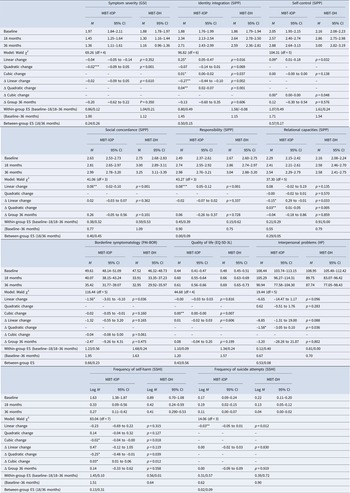In the above published article there was an editing error in Table 1. The corrected table is shown below.
Table 1. Predicted means, results from multilevel models and effect sizes 36 months after the start of treatment on primary and secondary outcome measures for patients randomly assigned to intensive outpatient mentalization-based treatment (MBT-IOP) (n = 44) or day hospital mentalization-based treatment (MBT-DH) (n = 70)

MBT-IOP, intensive outpatient mentalization-based treatment; MBT-DH, day hospital mentalization-based treatment; GSI, Global Severity Index of the Brief Symptom Inventory; SIPP, Severity Indices of Personality Problems; PAI-BOR, Personality Assessment Inventory – Borderline Personality Disorder section; EQ-5D-3L, EuroQol-5D-3L; IIP, Inventory of Interpersonal Problems; SSHI, Suicide and Self-Harm Inventory. Linear/quadratic/cubic change represent main effects of (polynomials of) time and indicate changes over time independent of group; Δ linear/quadratic/cubic change, interaction term of time (polynomial) with group indicating differential change of MBT-DH compared to MBT-IOP over time; Δ group 36 months, difference of MBT-DH compared to MBT-IOP at 36 months; ES, effect size by means of Cohen's d.
*p < 0.05 ** p < 0.01 *** p < 0.001.
The publishers apologise for this error.



